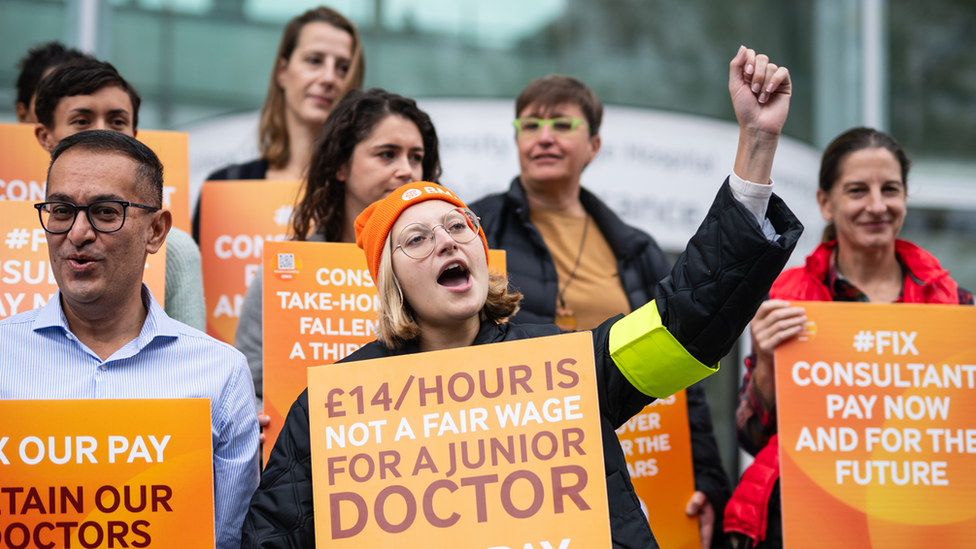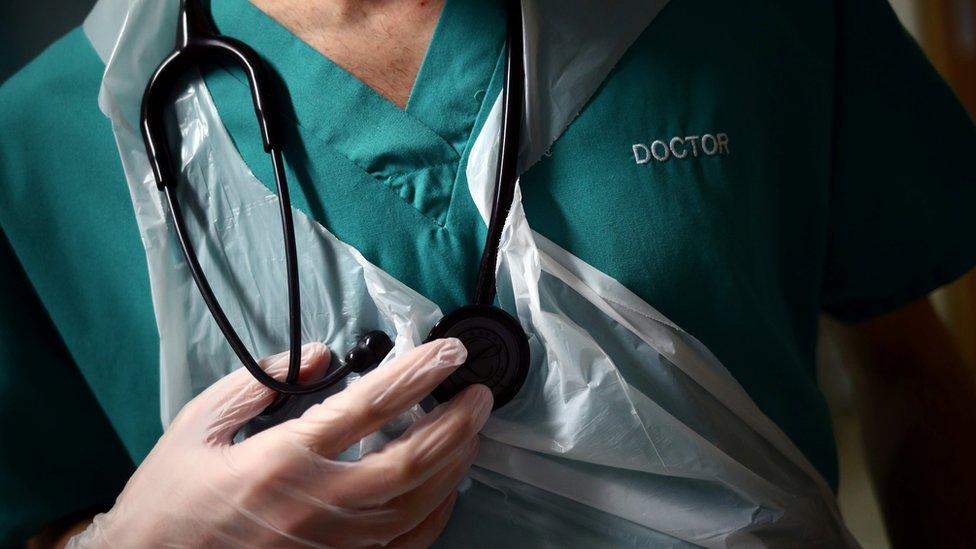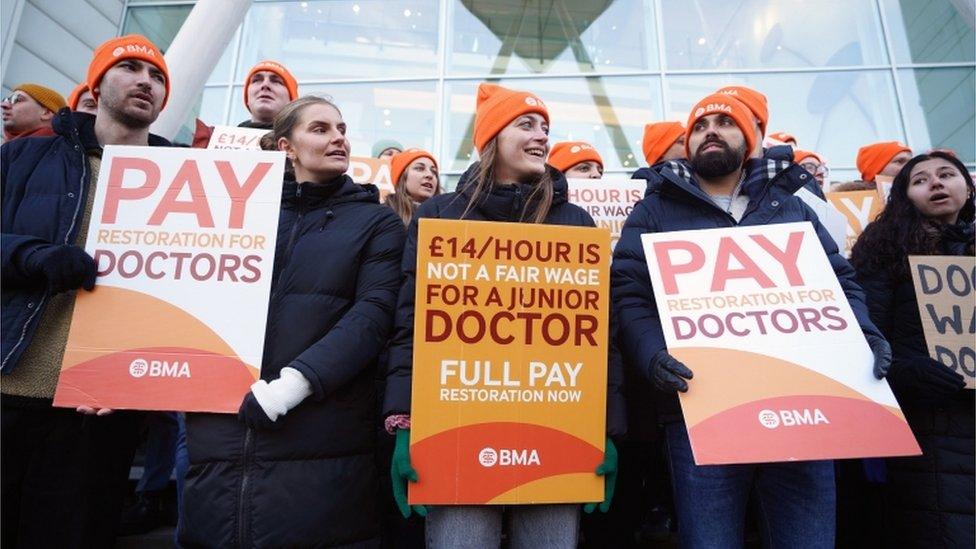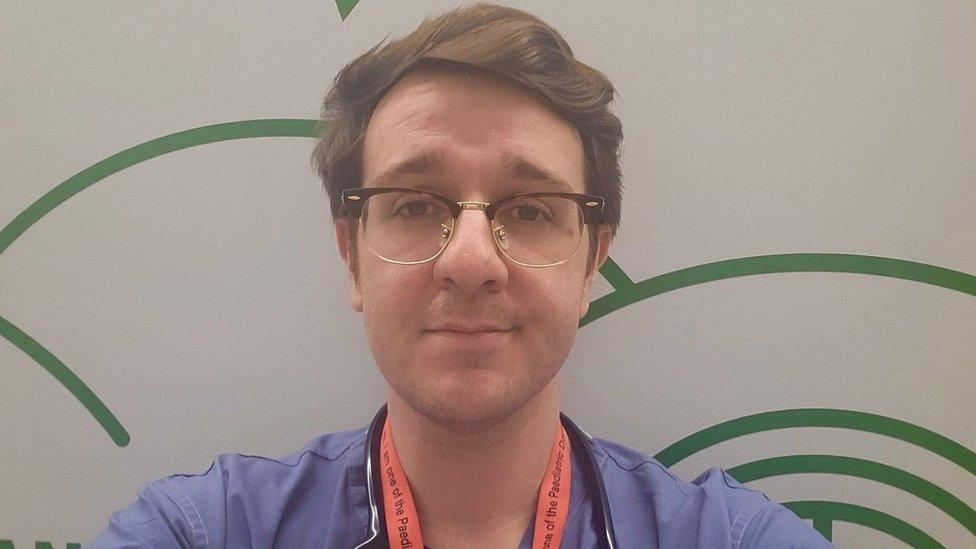Junior doctors in NI vote for strike action over pay
- Published

Junior doctors and consultants in England have already staged strike action in their dispute over pay
Junior doctors in Northern Ireland have voted to take strike action for the first time.
The result of the six-week ballot will see junior doctors taking part in a 24-hour walkout from 6 to 7 March.
The decision has been voted for as part of a long-running dispute over pay.
Of those balloted, 97.6% voted in favour of going on strike, the British Medical Association (BMA) said, adding that it showed junior doctors felt they had no other choice.
There was a 63.7% turnout for the ballot.
A newly qualified doctor in Northern Ireland earns £26,000 per year; in England the starting rate is over £33,000, and in Scotland it is £32,000.
The union said junior doctors' salaries in Northern Ireland had fallen by 30% over the past 15 years.
Junior doctors in England have already staged strike action in their dispute over pay.
'Disappointed and disheartened'
Dr Fiona Griffin, chairwoman of the BMA's Northern Ireland junior doctors committee, said the yes vote was "a clear indication of the strength of feeling among junior doctors about years of pay erosion".
'Era of quiet quitting' in NI - junior doctor
The BMA said there had been "a renewed sense of hope" on progress on pay with the return of a functioning Stormont executive and £688m being allocated by the executive for public sector pay increases.
But Dr Griffin added that a recent pay meeting between Department of Health officials and the BMA left junior doctors feeling "extremely disappointed and disheartened".
"We entered that meeting with the hope that good faith negotiations would commence on doctors' pay asks," she said.
"Instead we were presented with a fait accompli of a below inflation 6% uplift, that will be awarded in the next financial year.
"We were told any further discussions on pay had to be delayed until the ongoing Westminster pay negotiations with doctors in England had concluded, despite health and pay being devolved matters."
'Exacerbate' severe pressures
The Department of Health said industrial action "will inevitably exacerbate the already severe pressures on our health service".
It said it is committed "to further engagement with the BMA Junior Doctors Committee on pay, contract reform and other issues".
A spokesperson added: "This ballot of junior doctors was launched before the confirmation of additional funding for public sector pay in NI.
"With this funding now confirmed, the minister and department are seeking to resolve pay issues for the current financial year as a priority."
This includes a move to immediately implement the 2023/24 recommendations of the DDRB - a national NHS review body - for all doctors employed in the NI health service, the department said.
The DDRB offer will bring an average pay increase of 9.07% for junior doctors, it added, with those in their first year receiving a 10.68% uplift.


One day of industrial action will have a massive knock-on effect. If you've been waiting for an appointment to drop through the door and you're going to be seen on 6 March, it's very likely that that appointment will be rescheduled.
So there will be significant knock-on impact, with appointments being cancelled and people not being treated. GPs will not be able to operate and there is a likelihood that more senior consultants being moved into emergency care. That means their appointments will be cancelled too.
So while it's just 24 hours, its effects could be felt for weeks, perhaps months.
Some £688m has been allocated by the Northern Ireland Executive for public sector pay increases. The BMA says when that package of funding dropped, when Stormont was up and running again, it brought about a renewed sense of hope.
But BMA representatives had a pay meeting with the Department of Health last Thursday and they said it didn't go at all well.
They emerged feeling really disappointed and disheartened. What they want and what was offered to them are two different things.

Dr Tim Neill, who voted in favour of taking strike action, said students were deciding against medical careers while others were leaving the profession because they "don't feel valued in the work that they do".
Dr Neill described an "era of quiet quitting" among doctors who feel "powerless" and "restricted" in their ability to do the job.
"It takes a lot to take the wind out of your sails when you go into medicine to help people, but too often now we're seeing doctors losing that," he said.
- Published16 February 2024

- Published3 January 2024

- Published8 January 2024
